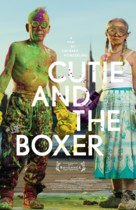Reviews provided by RottenTomatoes
A.O. Scott, New York Times: A movie that makes you feel less like a spectator than a guest, a friend welcomed into the home of an odd and fascinating couple. Read more
Joe Morgenstern, Wall Street Journal: Viewed in its entirety, "Cutie and the Boxer" is more than a great documentary. It's a great film. Read more
Moira MacDonald, Seattle Times: "Cutie and the Boxer" takes this tale of two artists and tells it with style and wit ... Read more
Ignatiy Vishnevetsky, AV Club: Though Noriko describes their relationship as being like "two flowers in one pot," with only enough room for one of them to blossom as an artist, the truth seems to be sadder, less romantic, and more relatable. Read more
Bill Goodykoontz, Arizona Republic: A painful, powerful portrait of the struggle and sacrifice required to create, and the cost that it can demand. Read more
Peter Keough, Boston Globe: Slyly comments on the ironies of the past half century in contemporary art. Read more
Andrea Gronvall, Chicago Reader: Intriguing as their present lives may be, without enough background to appreciate, for instance, Ushio's associations with Rauschenberg and Warhol, we can't gauge the full extent of the couple's regrets and losses. Read more
Peter Rainer, Christian Science Monitor: Their 40-year marriage seems like more of a trial than this overweening, lightly likable movie acknowledges. Read more
Jordan Hoffman, Film.com: A great triumph that refuses to color within typical emotional lines. Read more
James Greenberg, Hollywood Reporter: A finely textured and beautifully told story of two Japanese artists in New York and their challenging 40-year marriage. Read more
Betsy Sharkey, Los Angeles Times: Working as director and cinematographer, Heinzerling earned the couple's trust before turning his camera on their days and nights. But once that camera was running, there was no blinking, no turning away. Read more
Rene Rodriguez, Miami Herald: The story of an extraordinary marriage between two people bound together by their artistic impulse. Read more
Joe Neumaier, New York Daily News: They express love and vivaciousness, at once seeming like any couple walking down the street and yet unlike anyone you're lucky enough to spend time with. Read more
Farran Smith Nehme, New York Post: All that footage has been organized into a compact, graceful story arc. Read more
Steven Rea, Philadelphia Inquirer: Directed with invention and insight by Zachary Heinzerling ... Read more
Andrew O'Hehir, Salon.com: "Cutie and the Boxer" is one of the most unsentimental and unstinting portraits of marriage ever brought to the screen ... Read more
Walter V. Addiego, San Francisco Chronicle: The film neither simplifies the troubled relationship nor pushes us to take sides, but asks us to observe the complexities of their life together. Read more
Colin Covert, Minneapolis Star Tribune: Heinzerling captures candid, touching moments that illustrate the awe-inspiring power of love and acceptance. Read more
Liam Lacey, Globe and Mail: A lively double portrait of Ushio and Noriko Shinohara, two Brooklyn-based artists who, after 40 years of marriage, are still creating side by side, and tormenting each other. Read more
Peter Howell, Toronto Star: More than anything, the film expresses - at an almost subconscious level - the difficulties of discerning not only what real art is, but also what true love is all about. Read more
Cath Clarke, Time Out: It's a touching film and a fascinating glimpse into one of those couples you can't quite believe are still together. Read more
Sam Adams, Time Out: Except for the fact that one of them makes a living by slamming paint-dipped boxing gloves into canvas, Ushio and Noriko Shinohara could be any elderly couple-which is how documentarian Zachary Heinzerling treats them. Read more
Alissa Simon, Variety: Zachary Heinzerling's five-years-in-the-making pic is a warts-and-all portrait of love, sacrifice and the creative spirit. Read more
Nick Schager, Village Voice: Both amusing and acutely perceptive, it's a portrait of the way in which art is born from suffering, and how that pain can lead to both beauty and, ultimately, catharsis. Read more
Michael O'Sullivan, Washington Post: Movies twice as long are often half as eloquent. Read more

